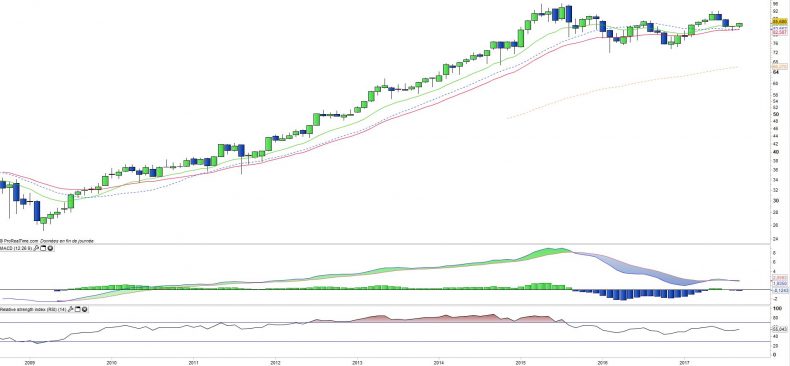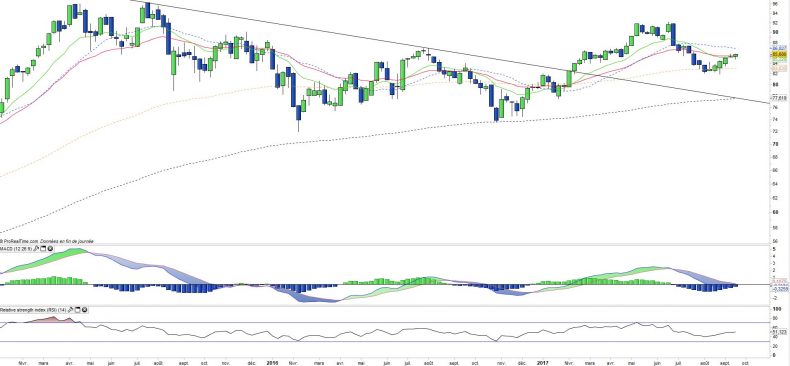Lyxor ETF stoxx 600 Healthcare (HLT) - 22/09/2017
Short term strategy : Neutral (50%) / Trend +
Long term strategy : Negative (35%) / Trend =
Characteristics of the ETF
Alternative ETF: SYH ( BNP THEAM Euro), CH5 ( Amundi Euro).
HLT is a UCITS ETF launched in 08/2006, listed in Euro on Euronext, which tracks the Stoxx600 Healthcare Europe index, composed of the 46 largests European stocks in the sector.
It should be noted that non-euro area stocks represent 71% of the index, which is not harmless in view of the potentially significant fluctuations of the £ and the CHF in relation to the Euro.
The cost of this ETF is 0.3% in the average of our selection and the AUM is approximately € 250m. The replication method is indirect (via a swap) and dividends are capitalized. This ETF is eligible for PEA (France).
Alternative ETFs: SYH (BNP THEAM, Euro), CH5 (Amundi, Euro).
Index & components
The two major swiss pharmaceutical stocks (Novartis and Roche) account for approximately one-third of the capitalization. The five largest holdings, beside the two Swiss values: Glaxosmithkline, Novo Nordisk and Sanofi, represent together 63% of the index.
The market capitalization are also huge: more than CHF 200bn for Roche and Novartis, while the next three are around € 100bn; this is a very important factor of inertia and this offset the relative narrowness of the index. We also note that the overwhelming majority of the companies that compose the ETF are pharmaceuticals, with the exception of Essilor (Ophthalmic Glasses) and Fresenius (Care Facility), so we consider HLT essentially as an ETF pharma Europe.
The pharmaceutical index is relatively non-volatile, due to the weight of its constituents as well as to a proven defensive profile, which is explained by the fact that the discovery of molecules and their distribution is not linked to economic cycles, while in developed countries drugs are reimbursed by mutuals or by the State. Moreover, health is a growth sector whose main drivers are innovation and increasing markets linked to pathologies of the developed world (aging and diabetes) as well as new viruses and resistance to antibiotics.
Emerging markets are an important outlet for the European pharmaceutical industry. The sector is confronted with the increasing maturity of molecule portfolios, price pressures in certain areas (eg diabetes) and government budgetary efforts to reduce healthcare costs. The solution lies in the innovation and partnerships / acquisitions of biotech companies that are expected to accelerate in the coming months - due to valuations that become attractive again - with new molecules with high potential to boost existing portfolios.
Major mergers with fiscal incentives seem to have been buried for a long time since the failure of the AstraZeneca / Pfizer operation, but the consolidation of the sector (2015/2016) was also caused by US regulatory uncertainties during the US elections that threatened to lower drug prices.
However, it seems that the new administration is falling back on many fronts, so the pharmaceutical sector should be spared
Latest developments
HLT is up by 7.8% since the beginning of the year, slightly lower than the Stoxx600 (9%), but significantly improved compared to 2016 (-9.7% against +1.7% for the Stoxx600).
The year 2016 was marked by the fall of two big names: Novo Nordisk (-36% after a warning due to the US diabetes pressure market) and Roche (-14% due to disappointments on its pipeline).
In 2017, the rebound of these two stocks led the index, particularly that of Novo Nordisk (+ 19% since the beginning of the year), while Novartis (+ 15.9%) and Sanofi + 10.5%), which together weigh more than 28% of the index are driven by successes on their respective pipelines in the first half.
Valuations have become reasonable again (PER 2018: 18x) and the sector seems to recover some momentum in recent weeks.
Monthly data
The monthly chart shows a long-term trend that remains positive but has turned into a trading range (€ 75/95) between 2015 and 2017. The moving averages have flattened in the € 80 zone as prices fluctuate around this zone. However, the downward trend line established in 2015/16 is broken and prices seem on the rise again, which is yet to be confirmed by the excess of the previous summit of May 2017 around 92 €.
The oscillators have also flattened in this neutral zone, but could return positive in the event of a new impulse which could therefore reactivate the upward trend of 2010-2015.
Weekly data
On the weekly chart, it can be observed that the prices are back to the EMA13/26 level after a rebound on the support materialized by the EMA100. The level of the 85 € is pivotal, because the prices and the moving averages meet here, and the direction that the prices will take from there will decide the medium term trend. The bullish impulse that started late August needs to be confirmed now to revive the medium term momentum and attack the € 95 resistance, which is the key to the long-term bullish recovery.
The oscillators are curving upward, but this still requires an effort for the index to tumble in positive dynamics.
ETF Objective
HLT is a UCITS compliant ETF that seeks to replicate the benchmark index Stoxx Europe 600 Healthcare Net Return.
The Stoxx Europe 600 Healthcare index is constituted with the largest stocks of the healthcare industry in Europe (46 companies).
Caractéristiques
| Inception date | 18/08/2006 |
| Expense ratio | 0,30% |
| Issuer | Lyxor |
| Benchmark | Stoxx600 Healthcare |
| Replication method | Indirect (via a swap) |
| Ticker | HLT |
| ISIN | FR0010344879 |
| UCITS | Yes |
| Statut EU-SD | Out of Scope |
| Currency | € |
| Exchange | Euronext Paris |
| Assets Under Management | 251 M€ |
| Dividend | Capitalisation |
| PEA (France) | Yes |
| SRD (France) | Yes |
| Number of Holdings | 46 |
| Risk | 3/5 |
Country breakdown
| Switzerland | 37% |
| United Kingdom | 18% |
| France | 13% |
| Danemark | 12% |
| Germany | 6% |
| Ireland | 4% |
| Netherlands | 4% |
| Others | 6% |
Sector Breakdown
| Healthcare | 95% |
| Industrials | 3% |
| Materials | 2% |
Top Ten Holdings
| Novartis | 18% |
| Roche | 15% |
| Sanofi | 10% |
| Glaxosmithkline | 8% |
| Novo Nordisk | 8% |
| Novo Nordisk | 7% |
| Shire | 4% |
| Koninklijke | 3% |
| Fresenius | 3% |
| Essilor | 2% |


